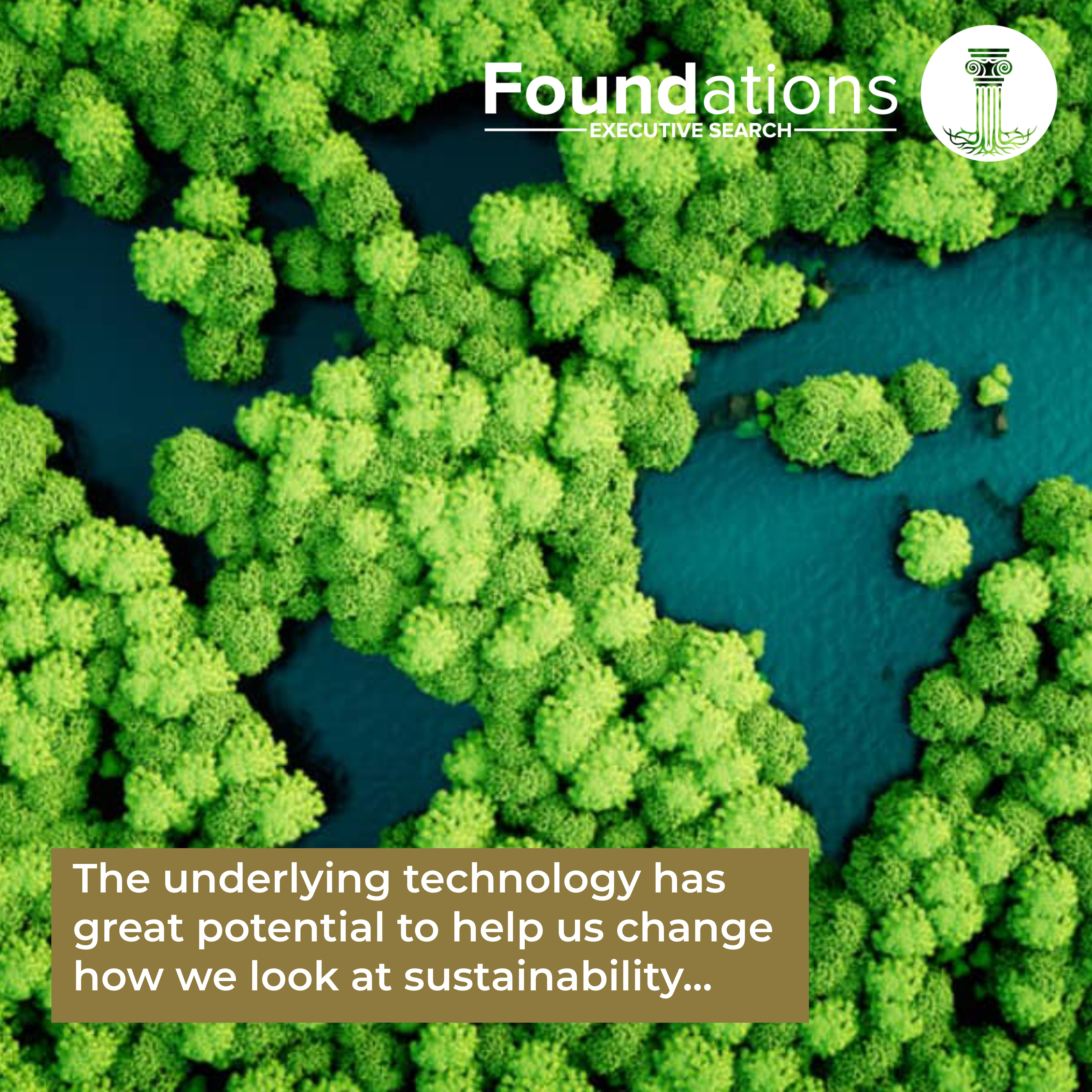Contact Us
Foundations Executive Search,
86-90 Paul St,
London, EC2A 4NE
+44 (0) 208 167 37 37
DEI Policy
Sustainability Policy
Privacy & GDPR

The topic of blockchain has become very prevalent in the news at the moment with the surge and recent crash in cryptocurrency. However, while a lot of news has focused on the fluctuation and instability of the monetary value attached to blockchain, the underlying technology has great potential to help us change how we look at sustainability within business through regulation on big business and improving supply chain accountability as we look forward to a greener future.
Recent documentaries, like Seaspiracy, highlight that even when it comes to certified sustainable and eco-friendly products, we have a long way to go when looking at how we audit supply chains and ensure that companies – and the certifying bodies – are abiding by their own policies and commitments.
So, is blockchain the answer?
As a technology already being successfully implemented by a number of supply chain companies – like the shipping giants Maersk – to track shipments and containers for years, why is this not being used by more companies and organisations who are promoting sustainability, and those who are auditing and certifying these industries?
In a world where consumers are demanding more eco-friendly products and services, and industries are leveraging this in their marketing, it is of utmost importance that their marketing and commitments are backed up by tangible and reliable data, both to make sure they providing the goods as advertised but also to ensure that consumer cynicism doesn’t become an issue in the push to a more sustainable economy.
We have seen with other areas of tech and especially with marketing from Apple around recent privacy updates, trust and transparency are becoming prominent concerns for consumers. So, for companies looking to capitalise on this and make real improvements to their sustainability programmes, public blockchain is possibly the best way to reassure consumers of their claims while also providing traceability internally to improve their own supply chains.
It has long been thought that sustainability is detrimental to the bottom line, but if it is done in a way that streamlines processes, reduces waste, and encourages more innovation it can form a viable and even beneficial model that also has the trust and loyalty of future customers.
However, the technology itself is not a panacea – it doesn’t provide all the answers or solve the accountability issues many certifying bodies and organisations face. It all comes down to the implementation and building a comprehensive system to deal with the issues and concerns that need to be addressed.
For instance, within the fishing industry, there are two main points that have not been addressed when it comes to supply chain visibility – The ecological impact of both the wider marine ecosystem and the surplus biodiversity caught in addition to the targeted quotas, and the amount to fish brought into the food chain from illegal fishing vessels. The second has started to be addressed with the inclusion of GPS and RFID tagging of fish but still has a long way to go, and as for the first – a major point in the Seaspiracy documentary – is done more on an honour basis, but could a system be put in place that potentially IDs species and catch size as it is hauled onto the boats? Maybe this is something we will see in the not-so-distant future, who knows…
Specifically, within the UK, as we forge our own path out of Europe and look to how we will differentiate ourselves from the competition, we have a unique opportunity to both embrace our past experience and reputation for producing world-class produce (both in regards to food and other industries) and stride forwards – leading the way with a new approach to sustainability and transparency.
It doesn’t take much to change an industry – even one so established as advertising as mentioned at the beginning for this blog, with Apple taking a stand on privacy and championing that as a USP, it has left the advertising industry and Apple’s competitors scrambling to catch up, could we as a country inspire a similar change to sustainability as the G7 looks to implement mandatory climate reporting for companies?
How does your business regulate its supply chain and does sustainability play a key role within your company’s objectives currently and for the future?